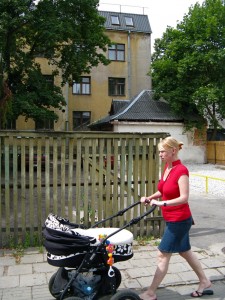
Kubilius said that his government's goal would be for Lithuania to be the second Baltic state to enter the eurozone after Estonia's expected convergence in 2011. Photo by the European People's Party.
VILNIUS — Prime Minister Andrius Kubilius declared that his government can reduce the budget deficit to 2 percent of gross domestic product within two years by reducing maternity benefits and raising the retirement age.
The budget deficit needs to be cut for the next three years if the country wants to have a change of adopting the euro as its currency by 2014.
“We are stepping up our strategic priority to enter the [private_supervisor]eurozone by 2014,” Kubilus told the Emerging Markets news website in May.
To get the euro, among other things, the country needs a budget deficit of less than 3 percent. In 2009, the government cut the budget across the board and this year it needs to cut it further again. The budget deficit for 2010 has been forecast at 8.1 percent of gross domestic product, but it needs to be cut to at least 5.5 percent, the International Monetary Fund says.
The government will try to reduce the deficit in halves by reducing the debt and increasing revenues.
“Our plan is to save about 2 billion (€579 million) out of the 4.5 billion litai. The other 2 billion, we believe, can come from the recovering economy,” Kubilius told journalists on Tuesday after a government meeting on the budget.
Though the country is waiting for more analysis and data before acting on their plans to raise taxes further, they are also set on reducing maternity benefits again and continuing with their plans to raise the retirement age to 65 for both men and women gradually by 2026.
Suggestions for new real estate and vehicle taxes were trashed during the meeting.
Social benefits
New mothers are likely to be offered one of two options. They will either be able to claim 100 percent of their current wage for one full year or 70 percent, then 40 percent of their wages for two consecutive years following giving birth.

Lithuanian mothers will face a benefit reduction if the government's proposed budget passes. Photo by Spyridon Kakouris.
The suggestions to cut maternity benefits come even before previously approved benefit cuts have come into force, which will reduce maternity benefits to 90 percent of previous wages for the first year then 70 percent for the second. They come into force on July 1.
The further cuts were suggested by the IMF and will help to reduce the payouts to families, which amounted to 1.47 billion litai (€426 million) last year.
Pension fund contributions will not be restored to their former levels, the prime minister promised, until the economy returns to its former healthy state. Swedbank predicted that the economy could reach pre-crisis levels in 2017.
Cuts to the pension fund contributions saved the country 513.5 million litai last year and will save the budget 585 million litai this year and 600 million the year after, Verslo Žinios reported.
The benefits and salaries of public servants are also set to be cut again, Kubilius said. [/private_supervisor] [private_subscription 1 month]eurozone by 2014,” Kubilus told the Emerging Markets news website in May.
To get the euro, among other things, the country needs a budget deficit of less than 3 percent. In 2009, the government cut the budget across the board and this year it needs to cut it further again. The budget deficit for 2010 has been forecast at 8.1 percent of gross domestic product, but it needs to be cut to at least 5.5 percent, the International Monetary Fund says.
The government will try to reduce the deficit in halves by reducing the debt and increasing revenues.
“Our plan is to save about 2 billion (€579 million) out of the 4.5 billion litai. The other 2 billion, we believe, can come from the recovering economy,” Kubilius told journalists on Tuesday after a government meeting on the budget.
Though the country is waiting for more analysis and data before acting on their plans to raise taxes further, they are also set on reducing maternity benefits again and continuing with their plans to raise the retirement age to 65 for both men and women gradually by 2026.
Suggestions for new real estate and vehicle taxes were trashed during the meeting.
Social benefits
New mothers are likely to be offered one of two options. They will either be able to claim 100 percent of their current wage for one full year or 70 percent, then 40 percent of their wages for two consecutive years following giving birth.

Lithuanian mothers will face a benefit reduction if the government's proposed budget passes. Photo by Spyridon Kakouris.
The suggestions to cut maternity benefits come even before previously approved benefit cuts have come into force, which will reduce maternity benefits to 90 percent of previous wages for the first year then 70 percent for the second. They come into force on July 1.
The further cuts were suggested by the IMF and will help to reduce the payouts to families, which amounted to 1.47 billion litai (€426 million) last year.
Pension fund contributions will not be restored to their former levels, the prime minister promised, until the economy returns to its former healthy state. Swedbank predicted that the economy could reach pre-crisis levels in 2017.
Cuts to the pension fund contributions saved the country 513.5 million litai last year and will save the budget 585 million litai this year and 600 million the year after, Verslo Žinios reported.
The benefits and salaries of public servants are also set to be cut again, Kubilius said. [/private_subscription 1 month] [private_subscription 4 months]eurozone by 2014,” Kubilus told the Emerging Markets news website in May.
To get the euro, among other things, the country needs a budget deficit of less than 3 percent. In 2009, the government cut the budget across the board and this year it needs to cut it further again. The budget deficit for 2010 has been forecast at 8.1 percent of gross domestic product, but it needs to be cut to at least 5.5 percent, the International Monetary Fund says.
The government will try to reduce the deficit in halves by reducing the debt and increasing revenues.
“Our plan is to save about 2 billion (€579 million) out of the 4.5 billion litai. The other 2 billion, we believe, can come from the recovering economy,” Kubilius told journalists on Tuesday after a government meeting on the budget.
Though the country is waiting for more analysis and data before acting on their plans to raise taxes further, they are also set on reducing maternity benefits again and continuing with their plans to raise the retirement age to 65 for both men and women gradually by 2026.
Suggestions for new real estate and vehicle taxes were trashed during the meeting.
Social benefits
New mothers are likely to be offered one of two options. They will either be able to claim 100 percent of their current wage for one full year or 70 percent, then 40 percent of their wages for two consecutive years following giving birth.

Lithuanian mothers will face a benefit reduction if the government's proposed budget passes. Photo by Spyridon Kakouris.
The suggestions to cut maternity benefits come even before previously approved benefit cuts have come into force, which will reduce maternity benefits to 90 percent of previous wages for the first year then 70 percent for the second. They come into force on July 1.
The further cuts were suggested by the IMF and will help to reduce the payouts to families, which amounted to 1.47 billion litai (€426 million) last year.
Pension fund contributions will not be restored to their former levels, the prime minister promised, until the economy returns to its former healthy state. Swedbank predicted that the economy could reach pre-crisis levels in 2017.
Cuts to the pension fund contributions saved the country 513.5 million litai last year and will save the budget 585 million litai this year and 600 million the year after, Verslo Žinios reported.
The benefits and salaries of public servants are also set to be cut again, Kubilius said. [/private_subscription 4 months] [private_subscription 1 year]eurozone by 2014,” Kubilus told the Emerging Markets news website in May.
To get the euro, among other things, the country needs a budget deficit of less than 3 percent. In 2009, the government cut the budget across the board and this year it needs to cut it further again. The budget deficit for 2010 has been forecast at 8.1 percent of gross domestic product, but it needs to be cut to at least 5.5 percent, the International Monetary Fund says.
The government will try to reduce the deficit in halves by reducing the debt and increasing revenues.
“Our plan is to save about 2 billion (€579 million) out of the 4.5 billion litai. The other 2 billion, we believe, can come from the recovering economy,” Kubilius told journalists on Tuesday after a government meeting on the budget.
Though the country is waiting for more analysis and data before acting on their plans to raise taxes further, they are also set on reducing maternity benefits again and continuing with their plans to raise the retirement age to 65 for both men and women gradually by 2026.
Suggestions for new real estate and vehicle taxes were trashed during the meeting.
Social benefits
New mothers are likely to be offered one of two options. They will either be able to claim 100 percent of their current wage for one full year or 70 percent, then 40 percent of their wages for two consecutive years following giving birth.

Lithuanian mothers will face a benefit reduction if the government's proposed budget passes. Photo by Spyridon Kakouris.
The suggestions to cut maternity benefits come even before previously approved benefit cuts have come into force, which will reduce maternity benefits to 90 percent of previous wages for the first year then 70 percent for the second. They come into force on July 1.
The further cuts were suggested by the IMF and will help to reduce the payouts to families, which amounted to 1.47 billion litai (€426 million) last year.
Pension fund contributions will not be restored to their former levels, the prime minister promised, until the economy returns to its former healthy state. Swedbank predicted that the economy could reach pre-crisis levels in 2017.
Cuts to the pension fund contributions saved the country 513.5 million litai last year and will save the budget 585 million litai this year and 600 million the year after, Verslo Žinios reported.
The benefits and salaries of public servants are also set to be cut again, Kubilius said. [/private_subscription 1 year]
— This is a paid article. To subscribe or extend your subscription, click here.












